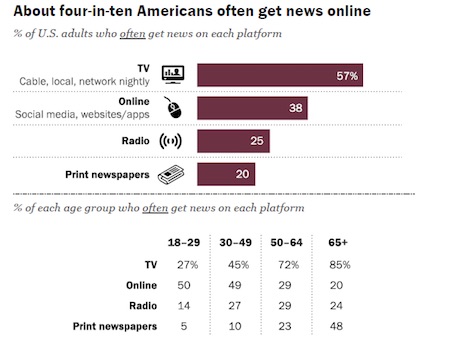Pew Research Center: Majority Say News Is Biased

The smarter way to stay on top of broadcasting and cable industry. Sign up below
You are now subscribed
Your newsletter sign-up was successful
News consumers show a clear preference for getting news on a screen, and the TV screen still leads the way, though there are signs of a big generational shift.
That is according to a new survey from the Pew Research Center, which also found that a majority of respondents think those news outlets are biased when covering political and social issues.
According to the survey, 57% of those news consumers "often" get news from cable, local or network TV, followed by 38% who often get it from social media or websites/apps. Radio followed at 25%, with newspapers trailing the pack at 20%.
Local TV news remains the top draw at 46%, followed by cable at 31% and network news at 30%.
But when the age is factored in, the screen preferences start moving online.
While 72% of those ages 50-64 often get news on TV, only 27% of 18-29-year-olds said they often got news from TV. By contrast, 50% of those 18-29 said they often got news online, while that figure was only 29% of those 50-64.
Print is in the most precarious position, the study suggests, since those who prefer to watch news still favor TV over online, while those who prefer to read it are migrating to reading it on a screen and increasingly on a mobile screen.
The smarter way to stay on top of broadcasting and cable industry. Sign up below
News consumers are skeptical of the outlets they frequent.
Only about two in ten said they have "a lot" of trust in the information they get, with social media the least trusted at only 4%.
As to how that information is being presented, only 24% said that news organizations covering political and social issues "deal fairly with all sides," while 74% said they "tend to favor one side."
The study found that while 54% of news consumers got at least some news on a mobile device in 2013, that number is now 72%.
The study was conducted in two parts. The first survey was conducted Jan. 12-Feb. 8, 2016, among 4,654 U.S. adults 18-plus who are members of Pew Research Center’s American Trends Panel. The second comprised 14 online surveys Feb. 24-March 1, 2016. 2,078 panelists participated, answering at least 10 of the 14 surveys.
Contributing editor John Eggerton has been an editor and/or writer on media regulation, legislation and policy for over four decades, including covering the FCC, FTC, Congress, the major media trade associations, and the federal courts. In addition to Multichannel News and Broadcasting + Cable, his work has appeared in Radio World, TV Technology, TV Fax, This Week in Consumer Electronics, Variety and the Encyclopedia Britannica.

